
Economic Reintegration of Returnees and Border-Province Development Strategies in the Post-Conflict Period
Reintegration must move beyond employment numbers towards productivity and income recovery:Large-scale job matching initiatives have absorbed many returnees, but employment alone does not ensure durable reintegration. Income has declined, vulnerability remains high, and skills mismatch persists. Policy must shift toward job quality, productivit...
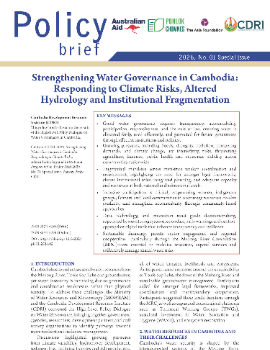
Strengthening Water Governance in Cambodia: Responding to Climate Risks, Altered Hydrology and Institutional Fragmentation
Good water governance requires transparency, accountability, participation, responsiveness, and the rule of law, ensuring water is allocated fairly, used efficiently, and protected for future generations through effective institutions and policies.Growing pressures, including floods, droughts, pollution, competing demands, and climate change,...
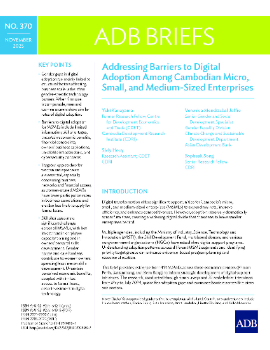
Addressing Barriers to Digital Adoption Among Cambodian Micro, Small, and Medium-Sized Enterprises
Gender gaps in digital adoption are mainly linked to structural factors affecting business scale rather than gender-specific technology barriers. When firm size is comparable, men and women owners show similar rates of digital adoption.Barriers to digital adoption for MSMEs include limited information, skill shortages, uncertain economic benefits,...
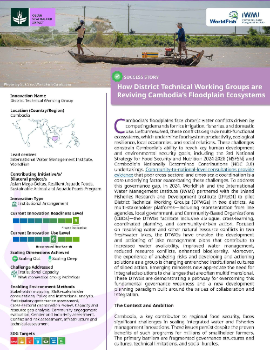
How District Technical Working Groups are Reviving Cambodia’s Floodplain Ecosystems
Cambodia’s floodplains face chronic water conflicts driven by competing demands for rice irrigation, fisheries, and domestic use. Left unresolved, these conflicts degrade multi-functional ecosystems, which undermine food system productivity, ecological resilience, local economies, and social relations. These challenges constrain Cambodia’s ability...
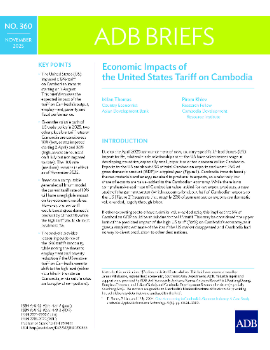
Economic Impacts of the United States Tariff on Cambodia
Due to the April 2025 announcement of new, country-specific United States (US) import tariffs, bilateral trade relationships with the US have taken center stage in developing countries, especially small, export-oriented economies like Cambodia. Exports to the US are about 33% of total Cambodian exports and worth 25% of gross domestic product (G...
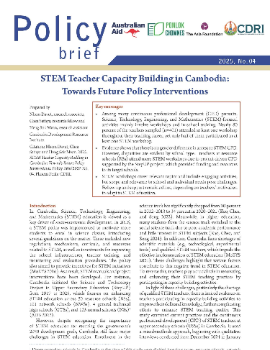
STEM Teacher Capacity Building in Cambodia: Towards Future Policy Interventions
Among many continuous professional development (CPD) pursuits, Science, Technology, Engineering, and Mathematics (STEM)-focused activities mainly involve workshops and in-school training. Nearly 80 percent of the teachers sampled (n=401) attended at least one workshop throughout their teaching career, yet only half of them participated in at least...
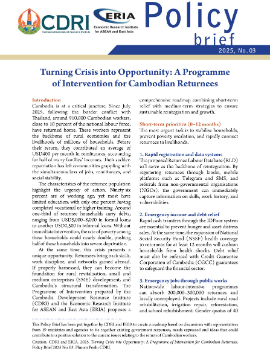
Turning Crisis into Opportunity: A Programme of Intervention for Cambodian Returnees
Following the 2025 border conflict with Thailand, nearly one million Cambodian migrant workers have returned home, threatening rural livelihoods and national stability. This policy brief outlines a comprehensive intervention program developed by CDRI and ERIA to address the crisis. It proposes immediate relief through cash transfers, job creation,...
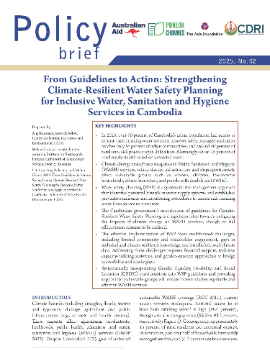
From Guidelines to Action: Strengthening Climate-Resilient Water Safety Planning for Inclusive Water, Sanitation and Hygiene Services in Cambodia
In 2023, over 90 percent of Cambodia’s urban population had access to at least basic drinking water services; however safely managed sanitation reaches only 56 percent of urban communities, and around 10 percent of rural ones still practice open defecation. Alarmingly, about 15 percent of rural residents still relied on untreated water.Climate...

Bridging the Academic Disparities between Boys and Girls in Cambodian Secondary Education
Key Highlights Girls in Cambodia consistently outperform boys academically, a trend observed since the 2014 national exam reforms, with boys facing higher risks of dropout. Boys are disproportionately affected by weaker academic engagement, higher absenteeism, economic pressures, and greater freedom, leading to socially undesirable activities...

Enhancing Rural Resilience for Climate-Induced Migration Responses
Key MessagesMigrants were mainly young adults, with men doing high-risk jobs like construction and women doing less risky jobs such as factory work. Migrant households’ livelihoods are affected by unpredictable weather conditions, reduced water availability, and extreme events like heatwaves, droughts and floods, which lowered crop yields and fish...
